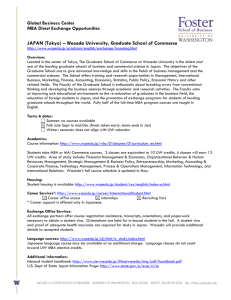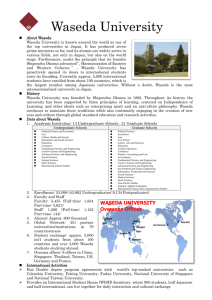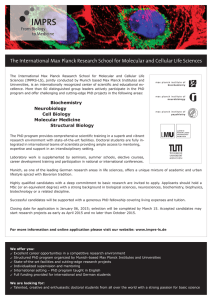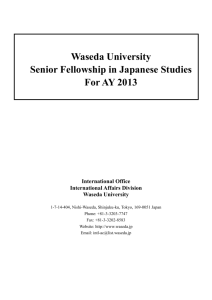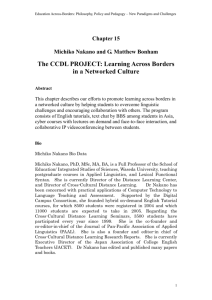Network evolution in coming 10 years: what`s the future of network?
advertisement
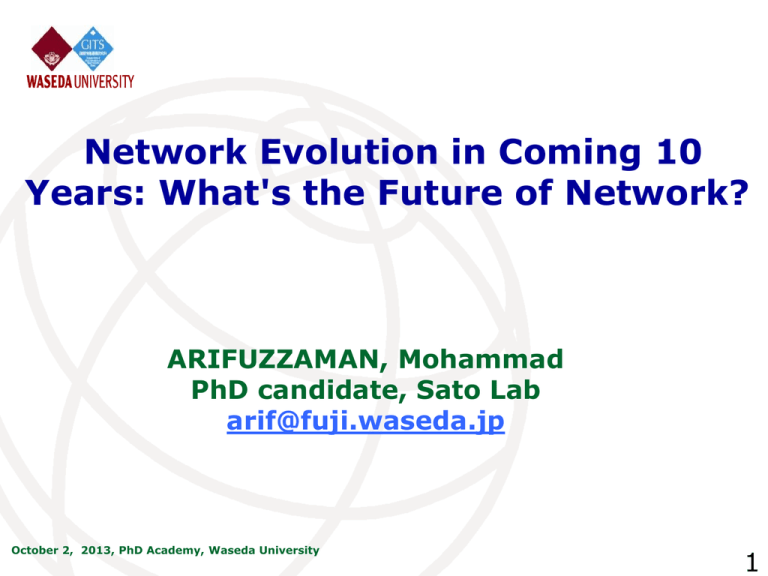
Network Evolution in Coming 10 Years: What's the Future of Network? ARIFUZZAMAN, Mohammad PhD candidate, Sato Lab arif@fuji.waseda.jp October 2, 2013, PhD Academy, Waseda University 1 Outline of Presentation Background Several Solutions for Future Network Summary October 2, 2013, PhD Academy, Waseda University 2 Background The Internet was designed in the 1960s to dispatch data to fixed addresses of static PCs. But today it connects a riot of diverse gadgets that can zip from place to place and connect to many different networks. As the underlying networks have been reworked to make way for new technologies, some serious inefficiencies and security problems have arisen. As a result, Over the past years, fundamentally new network designs have taken shape and are being tested. October 2, 2013, PhD Academy, Waseda University 3 Several proposed solutions for Future Internet SDN: Software-Defined Networking Self Organizing & Autonomic Networks Network resources and policy controller Network Virtualization & slicing Cloud Network & Network as a Services Information-Centric Networks/ Content Centric Network October 2, 2013, PhD Academy, Waseda University 4 Software Defined Networking(SDN) [ SDN is considered a major shift in networking which is evolved from work done at UC Berkeley and Stanford University in 2008. SDN is promoted by the New initiative ONF and recently by ITU-T SG 13 Future Networks and Under discussion at IETF SDN allows operators to use of centralized, programmable control-plane and data-plane abstraction, where control and data planes are separated. SDN gives operator ability to control/manage virtualized resources and networks without requiring new hardware technologies. October 2, 2013, PhD Academy, Waseda University 5 Network Function Virtualization Network Functions Virtualization aims to transform the way that network operators architect networks. By evolving standard IT virtualization technology to consolidate many network equipment types onto industry standard high volume servers, switches and storage, located in Data centers, Network Nodes and in the end user premises.[2] October 2, 2013, PhD Academy, Waseda University 6 Automatic Network Architecture(ANA) The ultimate goal of ANA is to design and develop a novel network architecture that enables flexible, dynamic, and fully autonomic formation of network nodes as well as whole networks. Self-Organizing Networks SON, (3GPP) Main functionalities: Self-Configuration (Plug & Play of new eNodeB) Self-Healing(e.g.Cell Outage Compensation) Self-Optimization(eg. Mobility Load Balancing, Handover Optimization, Energy Saving Management, etc.) October 2, 2013, PhD Academy, Waseda University 7 Information Centric Networking(ICN) ICN focus on data, rather than physical location of the data from where that data is to be retrieved from. Principal paradigm is not end-to-end communication between hosts - as it is in current Internet architecture. Publish- Subscribe model with more power to the subscriber In-network storage/ use Content router (CR) ; efficient communication through replication. Provide better mobility support, Energy efficient and more security than current architecture October 2, 2013, PhD Academy, Waseda University 8 Summary The Internet is straining to meet demands that its design never anticipated, such as supporting billions of mobile devices and transporting huge amounts of multimedia content. Future networks will be the infrastructure which connects the future Internet of people, content, clouds and things Now lets see, which network design offers what benefits, and is that design is the best way to achieve those benefits? And the answer of this fundamental question will decide Who's going to win the race of future network architecture? October 2, 2013, PhD Academy, Waseda University 9 Reference [1] https://www.opennetworking.org/sdn-resources/sdndefinition [2] http://portal.etsi.org/NFV/NFV_White_Paper.pdf [3] http://www.itu.int/en/ITU-T/Workshops-andSeminars/sdn/201306/Pages/default.aspx [4] http://www.technologyreview.com/news/509721/yourgadgets-are-slowly-breaking-the-internet/ October 2, 2013, PhD Academy, Waseda University 10 Thank October 2, 2013, PhD Academy, Waseda University You 11
